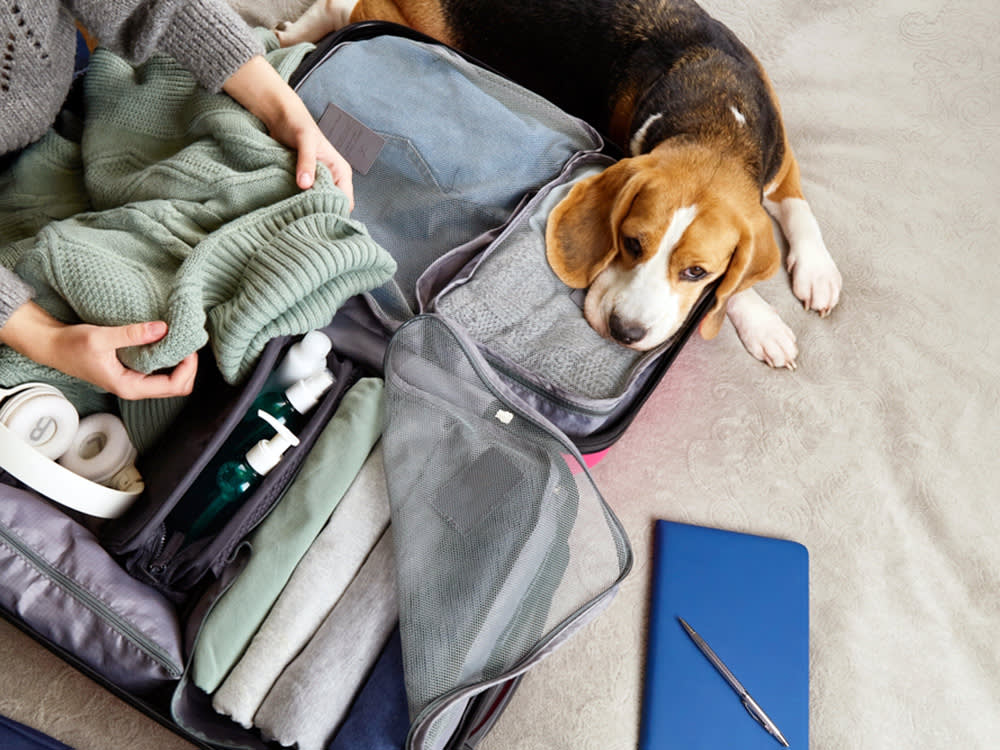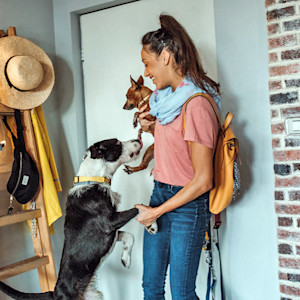What to Do With Your Dog When You Go Away On Holiday
Whether you’ve got a laid-back Lab or a temperamental Terrier, there’s a pet care option for everyone

Share Article
Heading off on a well-deserved holiday but fretting about what to do with your four-legged friend? Worry not – there are plenty of options to ensure your dog is well-cared for while you’re soaking up the sun, hitting the slopes or exploring new cities. Before they jump in your suitcase and whip out the puppy dog eyes to make you feel guilty for leaving, here’s a comprehensive guide to help you decide the best care for your dog when you’re away, from trusted sitters to luxurious doggy hotels.
Plan ahead
Regardless of the option you choose, planning ahead is a vital step to ensuring your pup is in the best place possible for them. Here are some universal tips to ensure your dog is well-cared-for while you’re away.
Meet and greet: always arrange a meeting between your dog and the caregiver beforehand. Dog trainer Katie Lottopens in new tab stresses, “Building up a rapport with someone before they look after your dog is crucial, for you and your pup.”
Start research early: good caregivers get booked up, so plan your arrangements well in advance. “Don’t leave it until the last minute when you’re going away in a week’s time to organise – good people often get booked up months in advance!” Katie warns.
Emergency planning: ensure your dog’s caregiver has all necessary information they need for your dog including your contact details whilst you’re away and your vet’s details. “Make sure that whoever is looking after your dog has details of the vet where your dog is registered and has other emergency contacts,” says Katie.
Recommendations: ask around for recommendations and check reviews. First-hand experience is often the best barometer for where your dog will feel most comfortable.
Background checks: one way to check your potential dog carer is “through your borough licence list, says Ria Edmenson, who runs a dog daycare and boarding service Colin & Co.opens in new tab. “Going through your council DEFRA list, and you’ll see all the companies on there and you can list it by what they’ve got the licence for, too.”
Family or friends
Leaving your dog with someone familiar is often the least stressful option for both you and your pet. If you have a trustworthy friend or family member who is willing and able to take care of your dog, this can be an ideal solution.
Pros:
Familiarity: your dog already most likely knows these people, which can reduce anxiety.
Attention: your dog is more likely to receive one-on-one attention, similar to what they’re used to.
Cost-effective: often, this is a free or low-cost option.
Cons:
Responsibility: caring for a dog is a big responsibility, and not everyone is prepared for it. Plus if anything were to happen “you want to be covered insurance-wise,” says Ria.
Experience: not everyone may be equipped to handle a dog, especially one with particular needs. Katie cautions, “Finding someone you trust to look after your dog is so important. It’s even more important when you might have a ‘tricky’ dog – whether that’s because they’re nervous, reactive or have health issues.”
Overindulgence: Ria humorously recalls, “We always joke when our dogs come back from a weekend or a week with the grandparents – they’re always twice the size. I don’t know why, they tend to just shove the food down them.”
Dog care platforms
Dog care platforms that connect dog owners with local dog lovers and trainers have become increasingly popular over the last few years. Sites such as Rover and Borrow My Doggy offer pet-sitting services in varying degrees and with different levels of security and experience, so if that’s the route you want to go down, it’s important to do your research into each platform and find one that works best for your dog.
Ria emphasises doing your research and asking for recommendations, too. “There are a lot of horror stories with Rover or Borrow My Doggy – some sitters post on these platforms but might not be professionals,” she says. “I would recommend going through recommendations from friends or family or double-checking with your local council for licensed sitters.”
Rover
Rover is a platform that allows you to find professional pet sitters who offer a range of services, from dog walking to overnight stays.
Pros:
Professional care: many sitters are experienced and can handle dogs with special needs.
Flexibility: from dog walking to house sitting, Rover offers a variety of services. There are also a number of sitters, so you are more likely to find one that suits your holiday dates.
Reviews and checks: profiles include reviews and background checks, making it easier to find a trustworthy sitter.
Cons:
Quality: not all sitters are created equal, and quality can vary. Ria notes, “I wouldn’t say they’re professionals; some do post on that platform, but if you’re going to go professional, it’s probably a safer bet going through a recommendation from a friend or family member.”
Cost: professional services can be pricey, especially for longer stays.
Trust issues: entrusting your dog to a stranger can be nerve-wracking, so it’s crucial to meet the sitter beforehand. Katie emphasises, “It is extremely important, regardless of how friendly your dog is, for you and your dog to meet the person before you drop them off and go on holiday.”
Borrow My Doggy
Borrow My Doggy connects dog owners with local dog lovers who might not have a dog of their own but would love to spend time with one.
Pros:
Community feel: the site matches dog owners with local dog lovers who might not own a dog themselves – it’s a fantastic way to build relationships within your community.
Cost-effective: often cheaper than professional services.
Personal touch: ‘borrowers’ are usually passionate dog lovers who can give your pet lots of attention.
Cons:
Experience levels: borrowers are often not professionals, and while they may love dogs, they might not have the experience needed for dogs with special needs.
Inconsistency: Since borrowers are not paid, their availability can be inconsistent.
Trust issues: as with any platform, it’s vital to meet the person looking after your dog and ensure they’re a good fit for you both.
Dog sitter
Hiring a dog sitter to stay at your home can be a great option, particularly for dogs who prefer familiar surroundings. Ria recommends platforms such as TrustedHousesitters.com for finding reputable house sitters, noting that this service can be particularly useful as it often attracts dog lovers who want to explore new localities while caring for pets.
Pros:
Minimal disruption: your dog stays in its own home, which can reduce stress, particularly for anxious or nervous dogs.
Security: having someone in your house can deter potential burglars (and water your plants!).
Personalised care: a house sitter can maintain your dog’s routine, ensuring they’re fed, walked and cuddled just as they would be if you were home.
Cons:
Cost: professional dog sitters can be expensive.
Trust: handing over your house keys to a stranger requires a significant amount of trust. Katie advises, “Red flags include no regular updates from whoever is looking after your dog and the person not having the relevant insurance to be looking after your dog.”
Availability: good sitters get booked up fast, so planning ahead is crucial.
Dog boarding
Dog boarding facilities have significantly evolved over the years, with many now offering luxury services that rival those of high-end human hotels. These facilities can range from basic setups to luxurious dog hotels that provide top-notch care.
Ria recommends opting for breed-specific boarding facilities, such as the Sausage Dog Hotel, which caters to the unique needs and temperaments of different breeds. “Being a dog daycare boarding hotel spa, I would say, come to me,” she jokes. “But in all seriousness, always go to a professional.”
“Using a dog hotel, especially a breed-specific one like the Sausage Dog Hotelopens in new tab, is always a good choice,” she says. She also advises avoiding traditional kennels in favour of dog hotels, which often offer a more relaxing environment – especially if you find one that specialises in your dog’s breed and temperament.
Pros:
Specialised care: many boarding facilities often provide tailored services, ensuring your dog gets the attention and care they need.
Amenities: high-end boarding facilities can include play areas, grooming services and even spa treatments.
Socialisation: dogs can interact with other dogs in a controlled environment.
Professional staff: trained staff can handle medical needs, administer medications and ensure your dog’s safety in every situation.
Cons:
Cost: luxury comes at a price, and boarding can be one of the more expensive options.
Stress: even in the best facilities, some dogs might find being away from home stressful.
Inconsistency: not all boarding facilities offer the same level of care, so it’s vital to do your research.
Kennels
Traditional kennels have long been a go-to for many dog owners, but they’re not without their drawbacks. If you do opt for a kennel, it’s crucial to visit beforehand, check their facilities, and ask plenty of questions about how they care for the dogs.
“Personally, I would not put my dog in traditional kennels. These can be highly stressful places for dogs, where there is often a lack of structure and the dogs only get limited time out of their crate a day,” Katie explains.
Pros:
Availability: kennels often have multiple spots available, making last-minute bookings easier.
Professional care: staff are typically trained to handle dogs and are experienced in dealing with various breeds and temperaments, as well as any emergencies.
Socialisation: for some dogs, kennels can provide a chance to socialise with other dogs, which they might enjoy.
Cons:
Stress: kennels can be noisy and overwhelming, which might stress out some dogs, particularly those who are anxious or have special needs
Lack of exercise: depending on the kennel, your dog might not get as much exercise as they would at home.
Health: the close quarters of a kennel can sometimes lead to the spread of illnesses or parasites among dogs.
Dog trainer
For dogs with behavioural issues or special needs, a professional dog trainer can be an excellent option, who wouldn’t want a little bit of revision for your dog whilst you’re on holiday?
Katie highlights the importance of meeting the trainer beforehand and ensuring they understand your dog’s needs. “It is extremely important, regardless of how friendly your dog is, for you and your dog to meet the person before you drop them off and go on holiday,” she says. “Lots of dogs, who are usually happy as Larry, can become distressed and show different behaviours when left by their owner with a stranger, so building up a rapport with someone before they look after your dog is crucial.”
Pros:
Expertise: trainers have the skills and knowledge to manage dogs with specific behavioural or medical needs.
Continuity: your dog’s training can continue while you’re away, possibly even improving some behaviours.
One-on-one care: trainers typically provide personalised care, ensuring your dog gets the attention they need.
Cons:
Cost: professional trainers can be quite expensive.
Availability: finding a trainer with availability can be challenging.
Trust: as with other sitters, trust is key.

Orla Pentelow
Orla Pentelow is Kinship UK’s Senior Editor. She has previously written for British Vogue, Bustle, Yahoo and The Telegraph. When not at her desk liking dog videos she’s out and about with her rescue pup, Luna, who works primarily as chief distractor.








